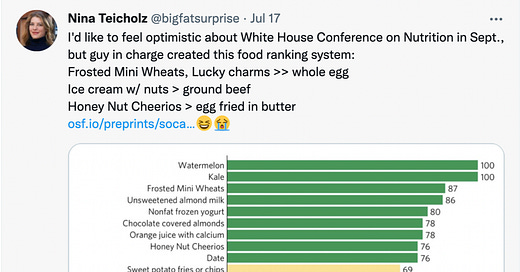Cheerios a Health Food, Says Leader of White House Conference on Nutrition
Dean of Tuft's Nutrition School Gives Top Rankings to Sugary Cereals
Recently I had a popular tweet, which I thought I’d share it with you—since it helps understand why one might have doubts about the upcoming White House Conference on Hunger, Nutrition and Health, billed as the biggest event on food policy in more than fifty years.
Here’s the tweethttps://twitter.com/bigfatsurprise/status/1548730633953968128:
Keep reading with a 7-day free trial
Subscribe to Unsettled Science to keep reading this post and get 7 days of free access to the full post archives.



